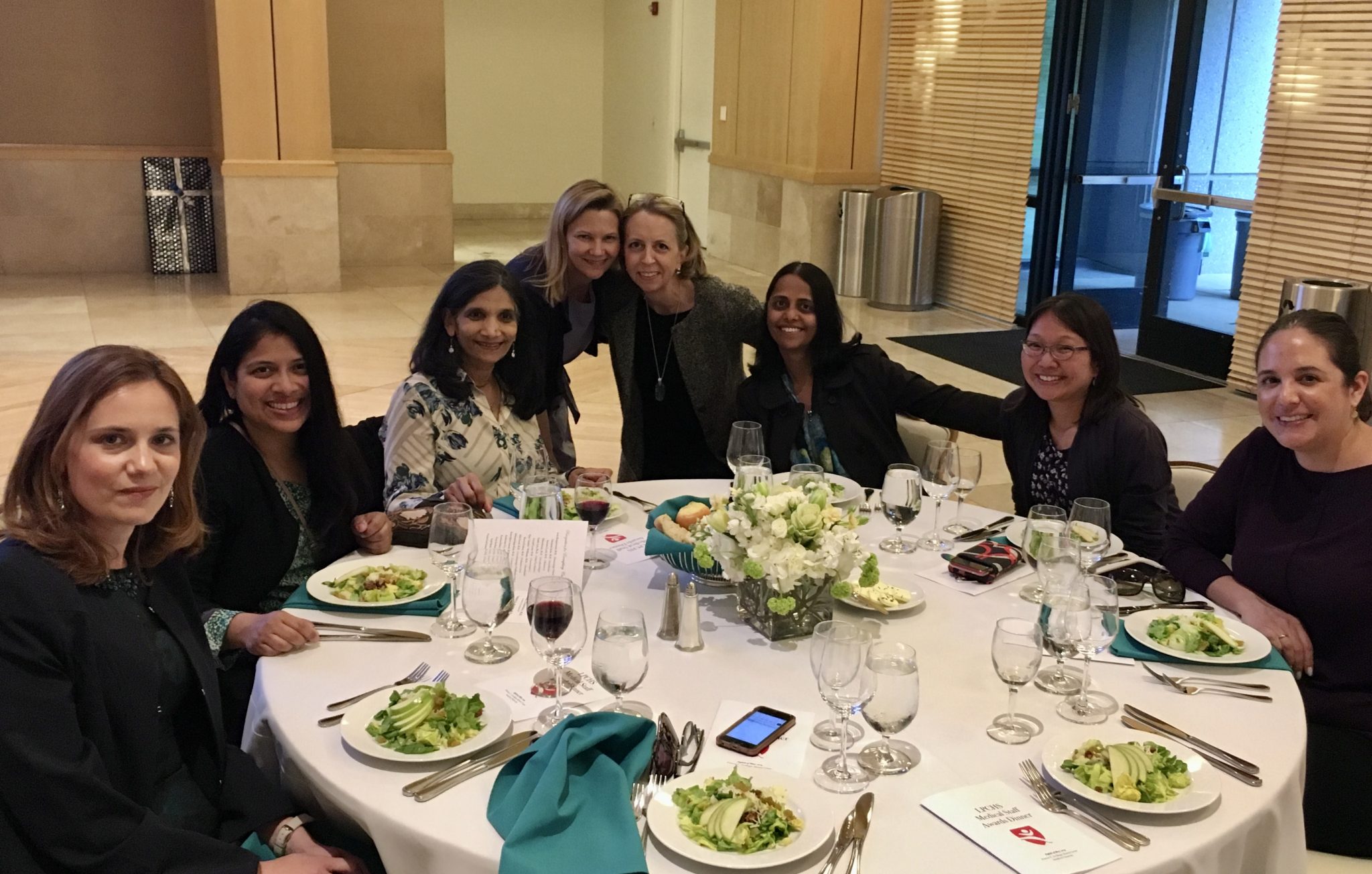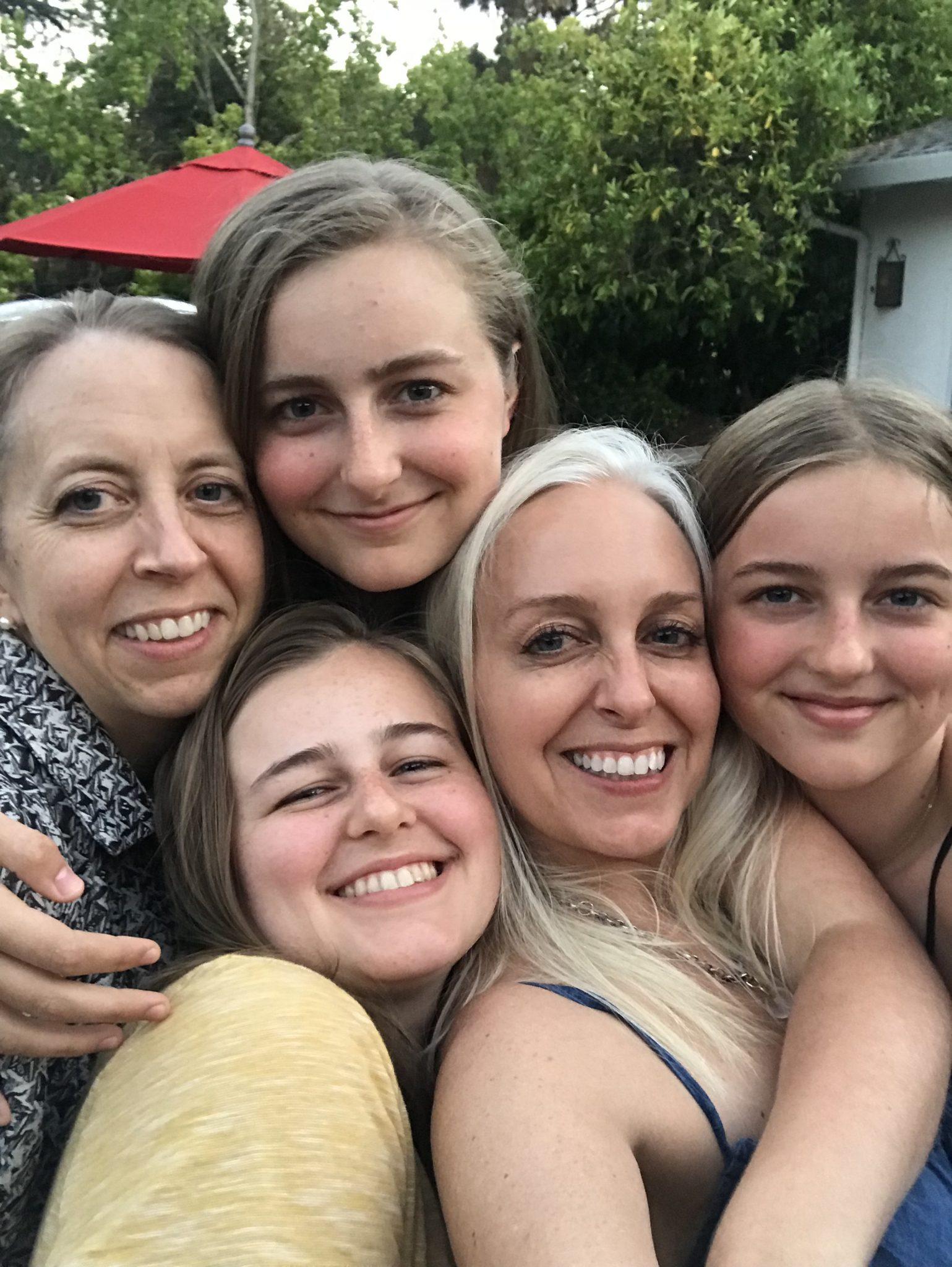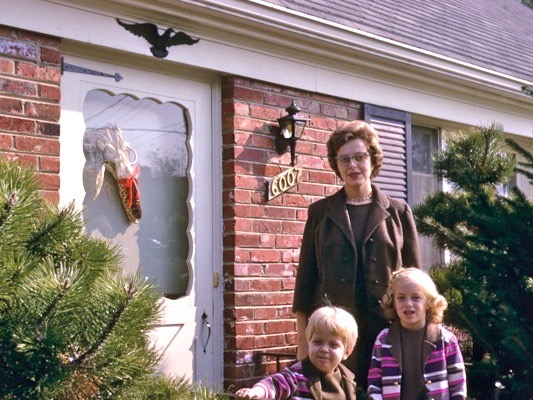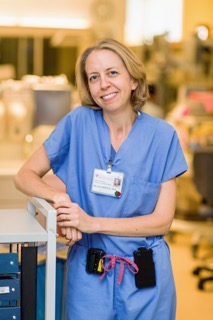14 Mar A Neonatologist’s Perspective on Women’s History Month
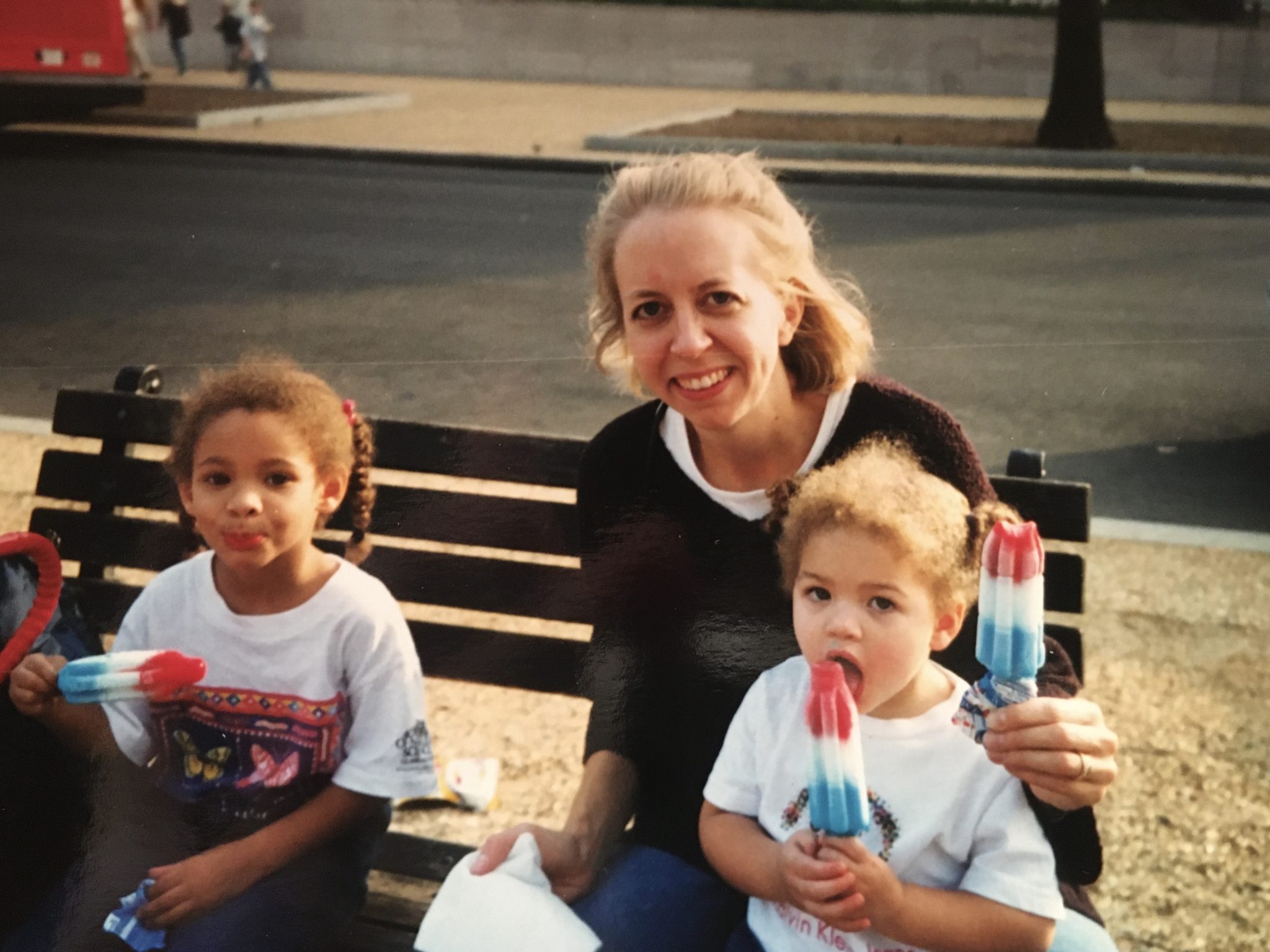
Photo of Dr. Susan Hintz with her two nieces in the late ’90s enjoying some quality time together.
Dr. Susan Hintz has always dreamed big. “It never occurred to me as a child that I wouldn’t be able to do what I dreamed of doing because I had both parents saying that it was a possibility,” she recalls. 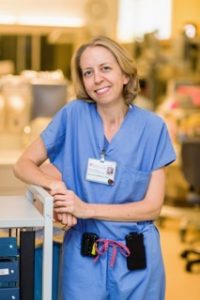
As a neonatologist at Lucile Packard Children’s Hospital Stanford and the Director of our Fetal and Pregnancy Health Program at Stanford Children’s Health, Dr. Hintz has made it her mission to better understand and improve outcomes for high-risk infants, complex fetal patients, and their families. As a professor at Stanford’s School of Medicine, she is training future doctors and researchers like the Office of Community Engagement’s Valley Fellow Emily Pang to make good on the promise of family-centered care — to recognize the importance of family for a hospitalized child.
Dr. Hintz serves on RMHC Bay Area’s Medical Advisory Committee and has dedicated her time, expertise, and resources to mentor Stanford medical student Emily Pang as she investigated the impact of RMHC Bay Area on families with critically ill children. (Stay tuned for their findings!)
For Women’s History Month, we asked Dr. Hintz to share her experiences as a woman in medicine, advice for women entering the medical field, and how her clinical and research work connects to the mission of RMHC Bay Area. Prepare to be inspired!
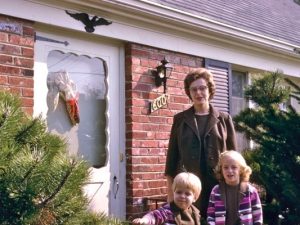 Q: Why do you think it’s important to celebrate Women’s History Month?
Q: Why do you think it’s important to celebrate Women’s History Month?
A: Historically, the efforts of women in the field of medicine have been less highlighted than those of men, making this month a good time to remember advances led by women. Women’s History Month is a good opportunity to take a pause, remember, and learn about the impact women have had on history and in our own fields. It’s also an opportunity to remember the women in our lives who have influenced us in a positive way.
This observance is inspiring to young women in medicine and other fields. For young girls and children, learning about the leadership and contributions of women lets them know that they themselves are powerful, and can affect positive change.
Q: What advice do you have for women entering the medical field?
A: It is important to find areas that inspire you and excite you, and recognize that you have the ability to make an impact on patients’ and families’ lives.
There have been barriers experienced by women when it comes to succeeding in academic medicine. I’m very happy that some positive changes have occurred during my life and career. However, even now, some barriers and negative mindsets may still exist, which can present challenges for women on this path. But challenges can be offset by building a consistent community of mentors, and a strong support system, who can help you achieve your goals and recognize your unique capabilities, and support through your journey.
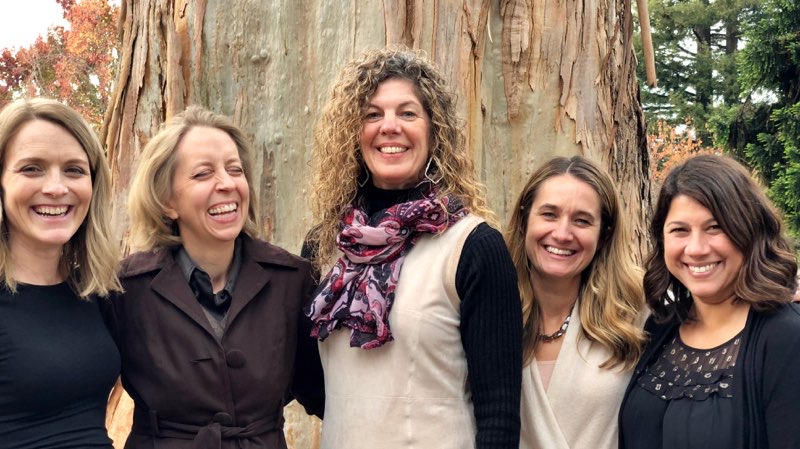
Q: What are some challenges and/or opportunities you have faced as a woman in medicine?
A: First, I’ll say pediatrics is an embracing community for women. But having said that, women in academic medicine have had to do a lot of juggling, not only focusing on being outstanding and dedicated physicians, providing training and mentoring, and building and leading research programs, but also usually being the primary point persons in caring for their families and home. Historically, this has meant that women may have had to make some difficult choices on their career paths. I hope and believe this is changing, with increasing expectations for shared roles in two-career families. I am very lucky that I’ve had mentors, supportive friends, and a family that was and are very supportive of me and my goals.
There have been changes over the years with respect to women entering medical training and joining faculties. For instance, recent data from the Association of American Medical Colleges shows that slightly more than half of applicants to American medical schools are women. For some specialties, such as Pediatrics and Obstetrics and Gynecology, women now make up more than half of full time faculty in medical colleges in the United States. However, it is still much less likely for women to hold full professorships or to be advanced into leadership positions of divisions or departments. There is increasing recognition of these disparities — and that they represent more than just a “time lag” for women moving into leadership. I am optimistic that I see more energy toward understanding the underlying causes of these gaps and more focus on addressing the issues.
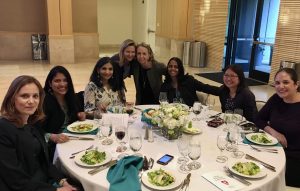
Q: How does your work connect to the mission of RMHC Bay Area?
A: My clinical work is both in neonatology and as the director of our Fetal and Pregnancy Health Program, which is the multidisciplinary complex fetal care center at Stanford Children’s Health. I have had the good fortune to work directly with our NICU and fetal center social workers and Ronald McDonald House at Stanford to care for patients and families along the entire continuum of care, including expectant mothers who are carrying babies that will need to be in neonatal intensive care, (many) traveling a long distances. It’s such an amazing support system for these families who may be facing the greatest crisis they’ve ever faced. To have a place filled with staff and other families who understand the unbelievable stress and worry that that experience can mean and come together to help them through it means everything.
Although there is a focus on the medical care that we are privileged to provide and the complex care coordination that we have at Packard Children’s, we would not be able to do what we do without the amazing support provided by Ronald McDonald House at Stanford.
From a research perspective, we have a special opportunity to learn from the experiences of Ronald McDonald House families. Through the outstanding work of Emily Pang, a Stanford medical student and Ronald McDonald House Charities Bay Area’s inaugural Valley Fellow at Stanford Medicine’s Office of Community Engagement, we are learning what families value and find most challenging, and also learning how we can best support them. We have been honored to work as a team with the House, Stanford School of Medicine, and families to understand the full impact of the Ronald McDonald House for families and patients, recognizing the kinds of services and needs they have when they come to the House, and understanding what investments could further support them through an extraordinarily challenging time. A major theme is that parents and families are gaining support and strength from their experience at Ronald McDonald House so that they can then bring that strength to their child’s bedside. To be at the bedside of your critically ill child is a profoundly stressful and traumatic experience, and parents can feel somewhat alone. This research is underscoring how valuable the Ronald McDonald House is to providing support and a community for parents and families during this time. I know that all the physicians, nurses, nurse practitioners, social workers, and really everyone at Lucile Packard Children’s Hospital Stanford are profoundly grateful to the Ronald McDonald House for their crucial partnership.
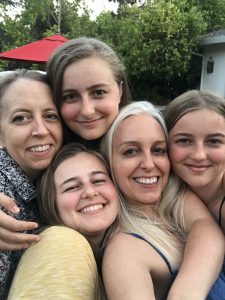
Q: What women role models have impacted your life?
A: There are many physicians in my field who have influenced me. A few women in my field of research have been nearly lifelong mentors for me, including Dr. Betty Vohr, who is a neonatologist and specialist in neurodevelopmental outcomes at Brown University. Dr. Maureen Hack, who passed away a few years ago, had a similar clinical and research focus. Both were extraordinarily inviting to me from a very early point in my career and both were unbelievably generous – generous with their time, their ideas, and their support. I learned from them that being an open, generous, and supportive mentor for young women may have an enormous and life-changing impact on their careers. I am truly fortunate to have many other women mentors and colleagues here at Stanford who have influenced me. The women in my division of Neonatal and Developmental Medicine and in our fetal center form an extraordinary community of positive, creative, and accomplished leaders, who I am privileged to have as my friends and support system.

Photo of Dr. Susan Hintz with her two nieces in the late ’90s enjoying some quality time together.
Dr. Susan Hintz has always dreamed big. “It never occurred to me as a child that I wouldn’t be able to do what I dreamed of doing because I had both parents saying that it was a possibility,” she recalls.
As a neonatologist at Lucile Packard Children’s Hospital Stanford and the Director of our Fetal and Pregnancy Health Program at Stanford Children’s Health, Dr. Hintz has made it her mission to better understand and improve outcomes for high-risk infants, complex fetal patients, and their families. As a professor at Stanford’s School of Medicine, she is training future doctors and researchers like the Office of Community Engagement’s Valley Fellow Emily Pang to make good on the promise of family-centered care — to recognize the importance of family for a hospitalized child.
Dr. Hintz serves on RMHC Bay Area’s Medical Advisory Committee and has dedicated her time, expertise, and resources to mentor Stanford medical student Emily Pang as she investigated the impact of RMHC Bay Area on families with critically ill children. (Stay tuned for their findings!)
For Women’s History Month, we asked Dr. Hintz to share her experiences as a woman in medicine, advice for women entering the medical field, and how her clinical and research work connects to the mission of RMHC Bay Area. Prepare to be inspired!
Tap photos to view larger image
Q: Why do you think it's important to celebrate Women’s History Month?
A: Historically, the efforts of women in the field of medicine have been less highlighted than those of men, making this month a good time to remember advances led by women. Women’s History Month is a good opportunity to take a pause, remember, and learn about the impact women have had on history and in our own fields. It’s also an opportunity to remember the women in our lives who have influenced us in a positive way.
This observance is inspiring to young women in medicine and other fields. For young girls and children, learning about the leadership and contributions of women lets them know that they themselves are powerful, and can affect positive change.
Q: What advice do you have for women entering the medical field?
A: It is important to find areas that inspire you and excite you, and recognize that you have the ability to make an impact on patients’ and families’ lives.
There have been barriers experienced by women when it comes to succeeding in academic medicine. I’m very happy that some positive changes have occurred during my life and career. However, even now, some barriers and negative mindsets may still exist, which can present challenges for women on this path. But challenges can be offset by building a consistent community of mentors, and a strong support system, who can help you achieve your goals and recognize your unique capabilities, and support through your journey.
Q: What are some challenges and/or opportunities you have faced as a woman in medicine?
A: First, I’ll say pediatrics is an embracing community for women. But having said that, women in academic medicine have had to do a lot of juggling, not only focusing on being outstanding and dedicated physicians, providing training and mentoring, and building and leading research programs, but also usually being the primary point persons in caring for their families and home. Historically, this has meant that women may have had to make some difficult choices on their career paths. I hope and believe this is changing, with increasing expectations for shared roles in two-career families. I am very lucky that I’ve had mentors, supportive friends, and a family that was and are very supportive of me and my goals.
There have been changes over the years with respect to women entering medical training and joining faculties. For instance, recent data from the Association of American Medical Colleges shows that slightly more than half of applicants to American medical schools are women. For some specialties, such as Pediatrics and Obstetrics and Gynecology, women now make up more than half of full time faculty in medical colleges in the United States. However, it is still much less likely for women to hold full professorships or to be advanced into leadership positions of divisions or departments. There is increasing recognition of these disparities — and that they represent more than just a “time lag” for women moving into leadership. I am optimistic that I see more energy toward understanding the underlying causes of these gaps and more focus on addressing the issues.
Q: How does your work connect to the mission of RMHC Bay Area?
A: My clinical work is both in neonatology and as the director of our Fetal and Pregnancy Health Program, which is the multidisciplinary complex fetal care center at Stanford Children’s Health. I have had the good fortune to work directly with our NICU and fetal center social workers and Ronald McDonald House at Stanford to care for patients and families along the entire continuum of care, including expectant mothers who are carrying babies that will need to be in neonatal intensive care, (many) traveling a long distances. It’s such an amazing support system for these families who may be facing the greatest crisis they’ve ever faced. To have a place filled with staff and other families who understand the unbelievable stress and worry that that experience can mean and come together to help them through it means everything.
Although there is a focus on the medical care that we are privileged to provide and the complex care coordination that we have at Packard Children’s, we would not be able to do what we do without the amazing support provided by Ronald McDonald House at Stanford.
From a research perspective, we have a special opportunity to learn from the experiences of Ronald McDonald House families. Through the outstanding work of Emily Pang, a Stanford medical student and Ronald McDonald House Charities Bay Area’s inaugural Valley Fellow at Stanford Medicine’s Office of Community Engagement, we are learning what families value and find most challenging, and also learning how we can best support them. We have been honored to work as a team with the House, Stanford School of Medicine, and families to understand the full impact of the Ronald McDonald House for families and patients, recognizing the kinds of services and needs they have when they come to the House, and understanding what investments could further support them through an extraordinarily challenging time. A major theme is that parents and families are gaining support and strength from their experience at Ronald McDonald House so that they can then bring that strength to their child’s bedside. To be at the bedside of your critically ill child is a profoundly stressful and traumatic experience, and parents can feel somewhat alone. This research is underscoring how valuable the Ronald McDonald House is to providing support and a community for parents and families during this time. I know that all the physicians, nurses, nurse practitioners, social workers, and really everyone at Lucile Packard Children’s Hospital Stanford are profoundly grateful to the Ronald McDonald House for their crucial partnership.
Q: What women role models have impacted your life?
A: There are many physicians in my field who have influenced me. A few women in my field of research have been nearly lifelong mentors for me, including Dr. Betty Vohr, who is a neonatologist and specialist in neurodevelopmental outcomes at Brown University. Dr. Maureen Hack, who passed away a few years ago, had a similar clinical and research focus. Both were extraordinarily inviting to me from a very early point in my career and both were unbelievably generous – generous with their time, their ideas, and their support. I learned from them that being an open, generous, and supportive mentor for young women may have an enormous and life-changing impact on their careers. I am truly fortunate to have many other women mentors and colleagues here at Stanford who have influenced me. The women in my division of Neonatal and Developmental Medicine and in our fetal center form an extraordinary community of positive, creative, and accomplished leaders, who I am privileged to have as my friends and support system.



